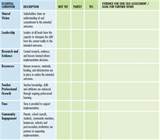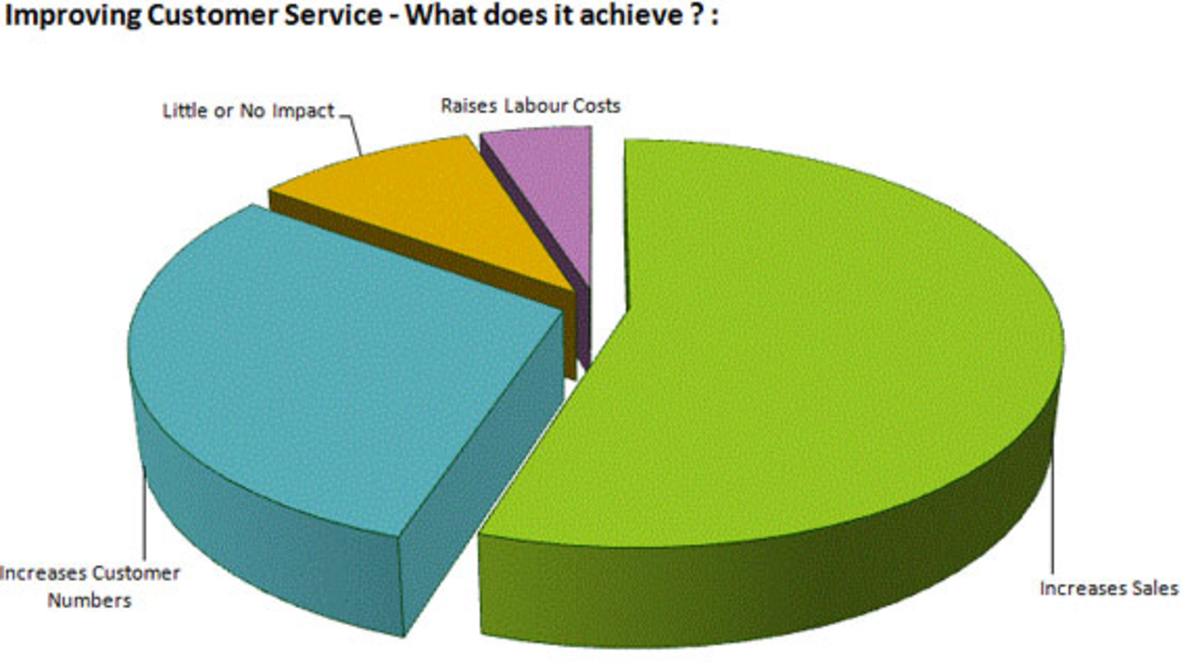Assessment on Self-Evaluation as a Business Tool
"Self-leadership is a process, strength, and skill of influencing the self to attain self-direction and self-motivation needed to accomplish specific tasks and goals."
To be an effective leader, one must be an effective leader to himself. Being able to manage personal behavior, identify strong and weak points is a sign of effective leadership skills. A person has to learn to effectively manage and develop the self to be able to place himself or herself on a position wherein he/ she could provide the greatest contribution to an organization or the community (Drucker, 2002). Self-leadership is a process, strength, and skill of influencing the self to attain self-direction and self-motivation needed to accomplish specific tasks and goals. It is composed of precise behavioral and cognitive strategies aimed for the purpose of positively influencing the self to become effective and efficient. Self-leadership is generally grouped into three primary categories—behavior-focused strategies, reward strategies, and constructive thought pattern strategies (Neck and Houghton, 2006; Hybels, 2002; & Nardi, 2005). Behavior-focused strategies are aimed at enhancing the person’s self-awareness in terms of behavioral management, particularly on areas where in the management of personal behaviors related to performing necessary and sometimes objectionable tasks (Neck and Houghton, 2006).

Self-Evaluation as a Tool
Behavior focused strategies consist of “self-observation, self-goal setting, self-reward, self-punishment, and self-cuing.” In particular, self-observation is intended to increase the person’s awareness of the dynamics—when and why he/she engages in specific behavior. This is a crucial and necessary step towards analyzing and identifying ineffective and unproductive behavior that could later be eliminated (Neck and Houghton, 2006 & Neck and Manz, 2007). One tool that is commonly used in behavior focused strategies is self-evaluation. This paper is aimed at presenting a review and critique of self-evaluation as a behavior-focused strategy tool in assessing self-leadership. It will also try to look at areas for improvement and provide an analysis on the impact of self-evaluation as a tool in terms of contemporary human resource practice.
cording to businessdictionary.com (2010), evaluation is the “rigorous analysis of completed or ongoing activities that determine or support management accountability, effectiveness, and efficiency”. It is the process of the ability to apply personal judgment of one’s capacity and personal capabilities to instigate successful performance of specified tasks at specific levels, exert greater effort, and continually persevere even at the face of adversity (Center for Positive Practices, 2005). Ergo, self-evaluation would involve the appraisal or assessment of personal behavior to gauge effectiveness, accountability, and efficiency. Self-evaluation as a tool have many purposes throughout various sectors of the society and various industries but still, retain the ultimate purpose—of measuring ones strength and weakness in pursuit of improving ones’ capacity. Being able to gauge and assess personal skills, behavior, and learning outcome based on very detailed parameters will allow a person to gain insight on personal strengths that could be enhanced and improved on, traits that must be unlearned or avoided, and develop new behavior that would prove useful to the person’s endeavor. If used in a classroom setting, self-evaluation would allow students to gauge their productivity, quality of work, level of learning or understanding of the subject or topic, all of which are based on evidence and explicit criteria that would allow the individual students the opportunity to learn their areas of strengths and identify weak points that they could improve on in the future (Rolheiser and Ross, n.d. & North Central Regional Educational Laboratory, 1995). In terms of community or volunteer organization, self-evaluation is an integral and critical aspect of the workings of the entire group. It is an “internal process of self-reflection and assessment” for the purpose of evaluating each member that would provide a collective assessment on the productivity of the whole community or organization (Clarke, 1996). In terms of management and business organization setting, particularly in the area of human resource, self-evaluation provides an overview of the plan as a tool for training and orientation at the same time identify areas for improvement to enhance productivity and service delivery (Oklahoma Office of Personnel Management, 2009 & Lee and Erez, 1997). Self-evaluation is an important facet of quality assurance and development wherein it is utilized operational goals to help attain overall company aims via HR strategies that would measure the improvement of each variables particularly focusing on effective and efficient client service deliver. This would be attained through effective leadership and management (Glasgow Metropolitan College, n.d.). In a sense, with a proper self-evaluation questionnaire and rubric, an organization’s human resource could efficiently use this as a tool to gain insight on each of its personnel’s perceived strength and weaknesses through very explicit parameters that could be verified and or quantified.

Full-time Filipino Virtual Assistants from $1.58/hour Amazing Webmasters, Programmers, and Content writers...In the Philippines Over 80,000 Filipino Virtual Ass
- Hire the best Filipino employees and virtual assistants the Philippines has to offer!
Outsource to the Philippines through the largest online marketplace for finding and hiring Filipino virtual assistants and employees.
Assessing the Efficacy of Self-Evaluation
Ideally, self-evaluation is geared towards personal exploration of the self to better understand self-dynamic through a standard or a set of prevailing measures to gauge personal aptitude with the aim of self-improvement. Often times, self-evaluation pose negative impression to most people that could cause anxiety because of equating it with criticism and failure. Some are terrified with the result that could be attributed to lack of confidence in their quality of work or self-value. These apprehensions towards self-evaluation could be based not just on personal perception of the self but could be deeply embedded on the community and is intertwined with the prevailing culture among the people and or within the organization.
Self-evaluation as a self-monitoring tool enhances a person’s ability through constant and regular monitoring. This would allow the person to monitor personal growth and provide motivation in enhancing specific kills while also highlighting areas for improvement that could be easily addressed and identified through initial self evaluation outcomes. Furthermore, it also allows the person to incorporate feelings with personal capacities; for instance competence, physical appearance, and behavioral conduct with self-worth, self-esteem, and self-concept (Berns and Berns, 2007). Therefore, personal perception of self has a direct correlation with the perceived personal capacities that would in turn affect the outcome of self-evaluation. For example, a person with a low self-concept or damaged self-esteem could easily downgrade his capability thus affecting his perception of his work competence. In a sense, self-evaluation would be not just about the self but involves a dynamic interplay of self as part of a larger community. And how much that community affects the perception of personal aptitude would have an influence on the results of self-evaluation. Moreover, self-evaluation in line with social comparison theory would suggest that social factors influence the judgment that a person has on himself. Integral variables in this case include the person’s mood and state of self-esteem. For case in point, research has been suggestive that low self-esteem and comparing self to someone who is inferior could either lower or raise self-evaluation. As an outcome, it is quite problematic to gauge the motives behind the commitment in taking the self-evaluation (Moskowitz, 2001). For instance, an enhanced commitment towards attaining specific goal would lead to a truthful and honest self-evaluation to validate perceived capacity towards self-improvement. On the other hand, self-evaluation could be motivated by a driven self-interest to enhance personal capacities in hopes to have a perceived higher commitment and or capacity to be above the rest and downgrade others in terms of comparison.
Lastly, self-evaluation with continuous self-monitoring does not necessarily translate to self-motivation and self-regulation. Self-regulation particularly is not something that could be passively learned through self-evaluation. The applicability of the result of the assessment would still be based on the person’s response towards the results. Receptiveness and or antagonistic response or perception on self-evaluation would be the turning point of the efficacy of the tool (Weiner, et al., 2003). Again, the outcome of self-evaluation is dependent on the drive of the person towards self-improvement and his commitment on improving his disposition.
Self-Evaluation
Do you think self-evaluation is an efficient tool to assess yourself?
Conclusion
In terms of contemporary human resource practice, self-evaluation is a crucial tool in aiding the assessment process of prospective candidates and even among employees. Self-evaluation could be a key towards strategic factor in delivering organizational success. The efficacy of self-evaluation does not directly translate to self-leadership without guidance and prudence in terms of human resource handling. What I found most critical is that Human Resource has the role and responsibility of ensuring that employees and people within the organization understood the aims and importance of self-evaluation and its role towards helping everyone in improving productivity and efficiency. Also, without proper amount of motivation—too much or too little, would greatly affect on how individuals would interpret the role of self-evaluation in their work. Guided accordingly, self-evaluation would be a great tool towards improving the capacity of individuals in terms of self-leadership. However, focusing on self-evaluation alone would cause crucial gaps in data gathering method. Sole reliance on self-evaluation is not advisable as there are other strategies and tools that could work with self-evaluation to ensure that there is check and balance in terms of interpreting variables and verifying the truthfulness of data gathered. This way, the true essence and purpose of self-evaluation is served not just for the benefit and growth of the company but of the individual as well.
References
Berns R., & Berns, R. M. (2007). Child, Family, School, and Community: Socialization and Support, 7th Ed. Canada: Thompson Learning, Inc.
BusinessDictionary.com (2010) Evaluation. Retrieved from http://www.businessdictionary.com/definition/evaluation.html
Center for Positive Practices (2005). Self-Efficacy. Retrieved from http://www.positivepractices.com/Efficacy/SelfEfficacy.html
Clarke, J. (1996). A Guide to Self Evaluation. Dublin: Combat Poverty Agency.
Drucker, P. F. (2002). Managing Oneself. Harvard Business Review on Managing Your Career. USA: Harvard Business School Press.
Glasgow Metropolitan College (n.d.) Human Resource Strategy. Retrieved from http://www.glasgowmet.ac.uk/humanresourcestrategy.aspx
Hybels, B. (2002). Courageous Leadership. Michigan: Zondervan.
Lee, C. & Erez, M., (1997). Effects of Career Self Management and Personal Predispositions on Career Advancement. Research and Practice in Human Resource Management, 5(1), 17-32
Moskowitz, G. B., Ed. (2001). Cognitive Social Psychology: The Princeton Symposium on the Legacy and Future of Social Cognition. New Jersey: Lawrence Erlbaum Associates, Inc.
Nardi, D. (2005). 8 Keys to Self Leadership: From Awareness to Action. California: Unite Business Press.
Neck, C. P., and Houghton, J. D. (2006). Two Decades of Self-Leadership Theory and Research. Past Developments, Present Trends, and Future Possibilities. Journal of Managerial Psychology, vol. 21 no. 4, pp. 270-295.doi: 10.1108002683940610663097
Neck, C. P., and Manz, C. C. (2007). Mastering Self-Leadership: Empowering Yourself for Personal Excellence, 4th Ed. New Jersey: Pearson/Prentice Hall.
North Central Regional Educational Laboratory (1995). Critical Issue: Working Toward Student Self-Direction and Personal Efficacy as Educational Goals. Learning Points Associates. Retrieved from http://www.ncrel.org/sdrs/areas/issues/students/learning/lr200.htm
Oklahoma Office of Personnel Management (2009). Self-Evaluation and Management Plan. State of Oklahoma, Office of Personnel Management & Merit Protection Commission, pp.1-44.
Rolheiser, C., and Ross, J. A. (n.d.) Student Self-Evaluation: What Research Says and What Practice Shows. Center for Development and Learning. Retrieved from http://www.cdl.org/resource-library/articles/self_eval.php?type=subject&id=4
Weiner, I. B., Reynolds, W. M. & G. E. Miller, Ed. (2003). Handbook of Psychology, vol. 7. New Jersey: John Wiley & Sons, Inc.






